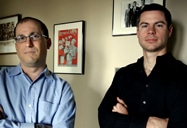You probably heard already: The “Death of Environmentalism” guys are back, once again explaining the follies of the green movement.
Their new book, Break Through, has created a lot of chatter with its argument that enviros are too darn pessimistic, and repeatedly shoot themselves in the foot with command-and-control regulatory thinking and doom and gloom talking.
I decided to check out the Cliff notes version of Breakthrough–published in article/excerpt form recently in The New Republic. What I read was both quite sophisticated and yet, at the same time, a bit grating. You see, Nordhaus and Shellenberger are really arguing against a state of mind, a zeitgeist even, rather than anything very specific. Which is fine–especially if you attack the right zeitgeist (which they do). The approach, however, allows them simultaneously to rebuke greens and yet also outline a clean energy policy agenda that most environmentalists–at least as I understand the term–would probably agree with.
It’s a matter of emphasis, really. It’s a matter of framing.
And indeed, it’s on the subject of framing environmental messages where Nordhaus and Shellenberger make their most resonant point. Let’s say it again: Doom and gloom = bad messaging. This is not exactly a new observation, and it happens to be grounded in tons of social science research and public opinion data. As American University professor Matthew Nisbet and I have argued repeatedly, you don’t want to frame global warming as a “Pandora’s Box” of untold catastrophes. Not only does this lead to a temptation to oversell the science about many still uncertain climate impacts. It also makes people feel helpless, or worse. As Nordhaus and Shellenberger put it:
Cautionary tales and narratives of eco-apocalypse tend to provoke fatalism, conservatism, and survivalism among voters—not the rational embrace of environmental policies. This research is consistent with extensive social-science research that strongly correlates fear, rising insecurity, and pessimism about the future with resistance to change.”
So how do you frame environmental issues? Well, for one thing, you use optimism–and a sense of can-do spirit–to your advantage. You don’t tell people that the world is going to end, or that they’re going to be poorer; rather, you tell them there are economic opportunities lying in wait if we address global warming. And then they’re more inclined to listen. Indeed, I would argue that if there’s one central reason the climate issue has shifted of late, it’s that many energy and transportation industry companies are changing their tune and waking up to the fact that they will still be making money–and perhaps even more of it–in a post-carbon world.
Not only do Nordhaus and Shellenberger get the central global warming message right–they go farther with detailed policy prescriptions. The bulk of their New Republic article explains why we must invest massively in new clean energy innovations, instead of just emphasizing caps on pollution all the time. After all, the latter strategy quickly and inevitably leads to counter-charges about wrecking the economy and keeping people poor–and suddenly we find economics cutting against environmental interests, rather than working in their favor.
My main problem with this line of argument is that I don’t disagree with it–which is precisely the point. I mean, does anyone deny that global warming is fundamentally an energy problem, and that solving it will necessitate bringing online innovative new technologies that let us power our societies in a way that’s both cheaper and cleaner?
I for one have always argued that dealing with this problem requires a three-legged-stool approach:
1) mitigation,
2) adaptation, and
3) innovation.
You can play up any leg of the stool at different times, but all are going to be critical. And we might add one more leg as well: Leadership. (This has always been the most wobbly one.)
At least in The New Republic, Nordhaus and Shellenberger appear to ignore leg 2 altogether. Instead they say we’ve stressed leg 1 too much and leg 3 too little, which is almost certainly true. But in saying this, are these authors really being very heretical? Would they really go so far as to disagree that there’s a need to cap emissions, for example? I’m not entirely sure, but I don’t think so. Even as they beat up on the standard environmental regulatory approach when applied to global warming, at the end of the New Republic piece Nordhaus and Shellenberger say this:
To be sure, the effort to reduce and stabilize global greenhouse gas emissions will require a major regulatory effort to make sure that everyone is playing by the same rules, provide a stable investment environment for nations and businesses, and increase the cost of fossil fuels relative to cleaner energy sources.”
Doesn’t this sound like emission caps to you–especially since for many nations and businesses, a “stable investment environment” means knowing how much they can and can’t pollute? It sure does to me. So my problem with Nordhaus and Shellenberger isn’t that they’re wrong.
No: It’s that where they’re right–which they usually are–it’s often because the answer is more obvious than I think they’d like to admit.
Subscribe to our newsletter
Stay up to date with DeSmog news and alerts






